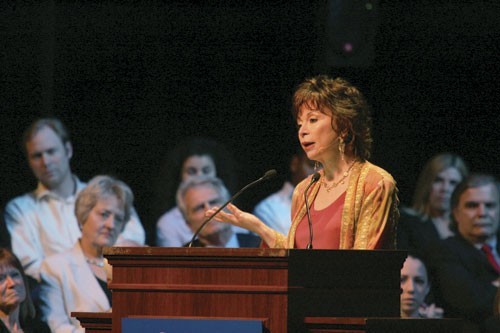
Tate Lecture goes south of the border (Photo by John Schreiber, The Daily Campus)
The empowerment of women is paramount to the progress of poor countries that are behind the curve of developed countries, according to Chilean author Isabel Allende.
“Women want a world where resources spent on war are spent on peace,” Allende said, adding, “The most backward countries are those who are poor.”
Allende captivated audiences with the story of her life. Her loves: Chile, writing and her husband. Her loathes: abuses of women, power and greed.
Allende was the featured speaker at the Willis M. Tate Distinguished Lecture Series at McFarlin Auditorium. She was irreverent yet elegant, leading the audience through a journey that sent laughter down the aisle and a chill up the spine.
Speaking about her escapades the first night she met William Gordon, the man who would become her husband, Allende recalled an anecdote of the morning after their first night together.
Gordon was taking her to the airport. She asked him where their relationship was heading. When he didn’t know how to answer, she said, “Look, I’m 45 years old and I live in Venezuela. I don’t have very much time, what are your intentions?”
Allende has written novels, short stories, plays and essays. Her works have been translated into 27 different languages. One book has been adapted for film, while another is the basis for a ballet.
Allende’s 1995 novel, “Paula,” is based on the yearlong illness and death of her daughter.
“The pain of losing a child is a cleansing experience,” she said. “I don’t cling to anything anymore, and I enjoy giving more than receiving.”
In addition to her book, Allende established the Isabel Allende Foundation, which promotes education, health and well being for women and children by supporting other nonprofit organizations across the globe.
She said the foundation was her way of commemorating her daughter and sharing her life with the world.
“What good is my experience of knowledge if I don’t give it to people?” she asked.
In the course of discussing her life, Allende tackled the tough topics of tragedy in Latin America. She shocked the audience with tales of child prostitution, spousal abuse and government corruption.
Allende’s style resonated with the audience, who repeatedly interrupted her speech with thunderous applause.
Junior Brandon Green said it was the best lecture he has attended at SMU, saying it was “better than Colin Powell.”
Green said Allende’s brutal honesty hit close to home, and she was very hilarious.
“It was more than a lecture – she made you comfortable with hearing her personal life,” Green said.
Allende has spent all of her life as a foreigner, she said. Born in Peru, she moved to Chile when she was 3 years old. A career as a print and broadcast journalist was cut short when her uncle, Chilean President Salvador Allende, was overthrown and assassinated in 1973 during a right-wing military coup. Her family fled to Venezuela, where she began writing fiction.
Dallas residents Eliot and Carol Litoff have been coming to the Tate Lecture Series since its inaugural season in 1982.
Eliot said that while she may not be one of the bigger-name speakers that the series attracts, “she was one of the best [lecturers,] clearly she’s very good. He also said she spoke of “deep truths.”
Carol said it was great to see such a powerful female speaker at the lecture. She enjoyed Allende’s sense of humor, too.
“The most entertaining and best lecturers are the people with a sense of humor,” she said.
The couple agreed this lecture was one of the few where the lecturer received multiple standing ovations.
“A lecture series is supposed to stimulate thoughts, that’s why you come,” Carol said. “There is no one in the audience who didn’t leave here without something to say to the person sitting next to them.”
The next Tate Lecture will be on March 28, when Juan Enriquez, founder of the Harvard Business School Life Sciences Project, will speak.









